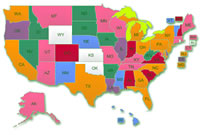Whether your husband’s death is expected or sudden, dealing with the details of death is not an easy job. At a time when you feel least able to cope with life, you must often make serious financial decisions that will have a lasting impact on your future well-being. It’s important to know as much as you can about your financial affairs, and stay on top of practical matters as much as you can.
As always, be sure to ask for help and support from family and friends. The following checklist can serve as a reminder of steps to take immediately after your husband’s death and during the time that follows:
| At the Funeral Home | |
| _____ | Select a funeral home to remove the body from the place of death |
| _____ | If the body will be transported to another location, contact a funeral home in the locality where the service will be conducted |
| _____ | Consider donation of body parts and organs |
| _____ | Decide on the disposition of the body (cremation, burial, etc.) |
| _____ | Decide on the type of service to be conducted |
| _____ | Discuss costs with the funeral director and be sure that the costs fit within your means. |
| _____ | Decide whether or not to have flowers, and what to do with the flowers after the funeral. |
| _____ | Notify the pallbearers you have chosen. |
| _____ | Order at least 10 copies of the death certificate |
| Notifications | |
| _____ | Notify close friends and relatives. |
| _____ | Prepare an obituary to be sent to the local newspapers and paid notices, if applicable. Include age, cause of death, place of birth, colleges attended, degrees received, occupation and major organizations where employed, honors received, immediate survivors, and time and place of services. |
| _____ | Prepare an announcement to be sent to friends, business associates, distant relatives, and the like, and arrange for printing. Make a list of people to whom the announcement should be sent. |
| _____ | Set up a system for acknowledgement of cards, letters, and phone calls received, and designate those who will accept phone inquiries and messages. |
| _____ | Notify your husband’s employer and/or any business contacts that will be affected by his death. |
| _____ | Notify your bank, brokerage companies, retirement plan administrators, and financial advisors |
| _____ | Notify life insurance companies. |
| _____ | Notify credit card companies and other creditors. |
| During the Funeral Period | |
| _____ | Ask family and close friends to help with housekeeping and food preparation chores. |
| _____ | Arrange for care of any young children during the days immediately following the death. |
| _____ | Make arrangements to continue business or investment plans on an emergency basis. |
| Probate and Administration | |
| _____ | Contact the attorney who will handle the estate. |
| _____ | Locate your husband’s will and review the provisions of the will and any trusts. |
| _____ | Petition the court for the appointment of an executor or administrator. |
| _____ | File the will with probate court to start the probate process. |
| _____ | Apply for an estate federal identification number from the IRS. |
| _____ | Open a bank account for your husband’s estate. |
| _____ | Apply to the probate court for a family allowance. |
| Claiming Your Death Benefits | |
| _____ | Inquire with your husband’s employer about death benefits, sick leave, vacation pay, and worker’s compensation benefits. |
| _____ | Make a thorough search for possible death benefits payable through credit card companies, credit life insurance policies, auto insurance policies, and accidental death policies. Contact each company with whom you have an account to inquire. |
| _____ | Contact unions, credit unions, auto clubs, religious groups, and fraternal organizations to which your husband belonged to find out about any available death benefits |
| _____ | If you have an old policy from a company that no longer exists, you can contact the National Insurance Consumers Helpline at 800-942-4242 to find out the current company’s name. |
| _____ | If you have credit life insurance coverage (insurance paid to a creditor to cover a debt, such as a mortgage, in case of death), write to the creditor to inform them that you will no longer be paying the debts |
| _____ | If your husband was a military veteran, call the Veteran’s Administration office in your area to determine your benefits. Ask for pamphlet 27-82-2 “A Summary of Veterans Administration Benefits”. |
| _____ | File for any civil service or pension death benefits that may be available. |
| _____ | Visit your local Social Security office to file for benefits. Be sure to bring a certified copy of your husband’s death certificate. |
| Taking Care of Business | |
| _____ | Inventory all assets and liabilities. |
| _____ | Request a safe-deposit box clearance from state taxing authorities, if contents were not removed before the box was sealed. |
| _____ | List all unpaid bills and arrange to pay them (use the categories “Estate, Joint, and Survivor” or “Him, Us, and Me”). Check with your attorney to be sure you don’t pay bills that are not your legal obligation. |
| _____ | Review buy/sell agreements for your husband’s business or investments. |
| _____ | Estimate your financial needs for the year and identify sources of cash. If there is a shortfall, decide how you are going to meet it. |
| _____ | Review your investment portfolio. |
| _____ | If you are the executor, follow the terms of the will to divide up the property. |
| _____ | Seek financial advice before making big decisions, such as selling your house or closing down a business. |







